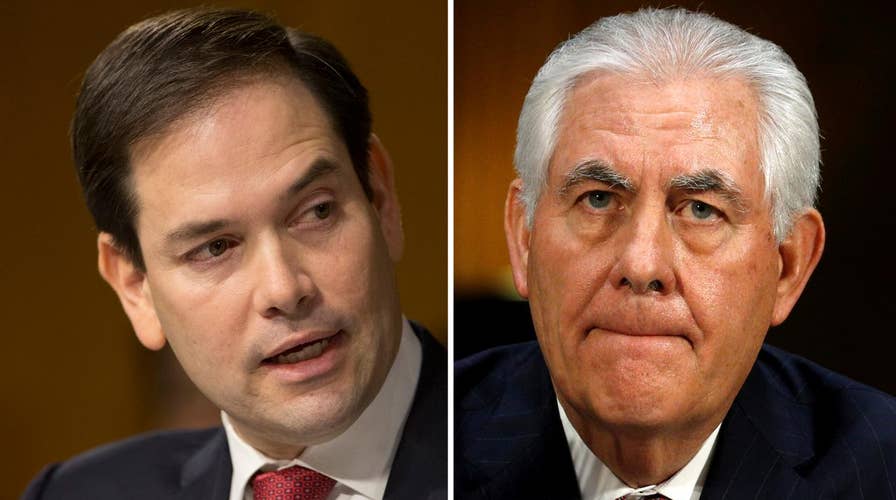Rubio questions Tillerson over human rights in Saudi Arabia
Secretary of state nominee explains his stance during congressional hearing
During the past 20 years, eight British universities -- among them Oxford and Cambridge -- have taken more than $292 million from Saudi Arabia and other Islamic governments. These contributions represent “the largest source of external funding to UK universities,” according to the director of Brunel University’s Center for Intelligence and Security Studies.
This phenomenon is also not isolated to the United Kingdom: Harvard alone has received more than $30 million from the Saudi government.
Stop and think about this.
Money used to fund professorships, scholarships and centers of study is coming from regimes with long histories of violating religious freedoms. As well-intentioned as the contributors might be, it is clear these contributions are not arriving without strings attached. A cynic might say that they are buying off professors and universities in order to advance their own agenda, even while forbidding similar activities within their own countries. They are happy to exploit Western freedoms in order to strengthen their own theocracies.
They’re not just doing it via the academy, either.
Saudi Arabia also plays a significant role in the establishment of mosques -- the centerpieces of Muslim communities -- across the world. According to a hearing conducted before the Subcommittee on Terrorism, Technology and Homeland Security in 2003, the vast majority of mosques in the United States were then under Saudi influence. In all, it is estimated that Saudi Arabia has spent more than $100 billion to spread the country’s worldview.
Saudis want and enjoy freedoms around the world, but we must ask ourselves: Where is the equal religious freedom offered by the Saudi government toward people of Buddhist, Hindu or Christian faith, or even atheists, in their own country?
Rather, Saudi Arabia remains one of the most oppressive regimes in the world when it comes to freedom of conscience. A recent USCIRF report on the country says Saudi Arabia “continues to prosecute, imprison and flog individuals for dissent, apostasy, blasphemy and sorcery.” The Kingdom has been designated as a “country of particular concern” by the United States Commission on International Religious Freedom.
Not long ago, I learned about a group of Indian Christians who were arrested in Saudi Arabia during a raid conducted on a private home worship service. While they were all eventually released, the Saudi authorities notified them that their permits for working and living in the country would not be renewed. Once they expire, the Indian Christians have to leave the country.
On the other hand, right now an extremist religious preacher wanted by the Indian government -- who has received massive funding from the U.K. and Saudi Arabia -- enjoys safe haven in Saudi Arabia.
And while cases like these freely happen in Saudi Arabia, the Kingdom is allowed to funnel billions of dollars to countries to promote their brand of Islam -- that exportation certainly contributed to the 9/11 attack on New York.
This hypocrisy must end. The free exportation of extremist ideologies -- religious or atheistic -- is what drives people to violence and the curtailment of freedoms.
The international community must adopt a reciprocal approach to religious tolerance in response to those nations that abuse our freedoms while forbidding freedom among their own. It is high time that the West, with its evolved understanding of freedom of conscience and liberty, begins to ask for this kind of reciprocity in bilateral relations with nations.
The “Religious Freedom International Reciprocity Enhancement Act,” introduced last July to the U.S. Congress, is an example of the type of action that nations may take to protect themselves from the inadvertent importing or exporting of ideology promoting bigotry, intolerance and persecution. The act would forbid a national of any country that limits the free exercise of religion from spending money in the United States to promote a religion. Money is also raised in America and the U.K. among diaspora communities to fund religious extremist groups (not just Islamic groups) in Asia, the Middle East, Africa and Europe.
More countries need to adopt similar and other measures now that three-quarters of the world’s population lives in a country “with high or very high restrictions or hostilities” on the freedom of conscience.
Religious tolerance and the freedom of conscience and belief are cornerstones of human rights affecting all other rights. We must hold nations accountable for the safeguarding of these freedoms, and those who restrict them ought not to be able to freely promote their ideology -- in any form -- abroad.
America needs to act and not be focused on economic considerations only.
Most Rev. Dr. Joseph D’Souza is the Moderating Bishop of the Good Shepherd Church and Associated Ministries of India. He also serves as the President of the All India Christian Council. He is the recipient of numerous awards and accolades for his work as a human rights activist, and especially on behalf of India’s Dalits (sometimes called “untouchables”). He is also the founder and
International President of the Dalit Freedom Network. He can be reached at: moderator@gsoim.org





















